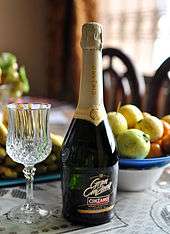Cinzano
 | |
| Product type | Vermouth |
|---|---|
| Owner | Gruppo Campari (since 1999) |
| Country |
|
| Introduced | 1757 |
| Markets | Available worldwide |
| Previous owners |
Cinzano International S.A. Grand Metropolitan (1992–97) Diageo (1997–99) |
| Website |
www |

Cinzano [tʃinˈtsano] is an Italian brand of vermouth, a brand owned since 1999 by Gruppo Campari.[1] It comes in four versions:
- Cinzano Rosso,[2] which is amber-coloured;[3]
- Cinzano Bianco, which is white and drier than Rosso, yet still considered a sweet vermouth;[3]
- Cinzano Extra Dry, a dry vermouth;[3]
- Cinzano Rosé, the newest of the four, rosy-coloured with orange highlights[3]
History
Cinzano vermouths date back to 1757 and the Turin herbal shop of two brothers, Giovanni Giacomo and Carlo Stefano Cinzano, who created a new "vermouth rosso" (red vermouth) using "aromatic plants from the Italian Alps in a [still-secret] recipe combining 35 ingredients (including marjoram, thyme, and yarrow)".[2] What became known as the "vermouth of Turin" proved popular with the bourgeoisie of Turin and, later, Casanova.[2]
Cinzano Bianco followed, based on a different combination of herbs that included artemisia (wormwood), cinnamon, cloves, citrus and gentian; it was followed by an Extra Dry version.[2] Exports began in the 1890s, to Argentina, Brazil and the USA, among others.[2] In Paris in 1913, Cinzano was the first product to be advertised with a neon sign on its roof.[4]
Cinzano remained a family-run business until 1985. Beginning that year, the Marone family, Turin industrialists, began to sell shares in the business, culminating in 1992 with an agreement to turn Cinzano International S.A. entirely over to International Distillers & Vintners, a wholly owned subsidiary of Grand Metropolitan.[5] At the time of its sale, Cinzano's share of the vermouth market in Europe was measured in the low single digits, sales that placed it a distant second to Martini.[5]
As a result of a 1997 merger, Grand Metropolitan became Diageo; two years later, Diageo sold Cinzano to the privately held Gruppo Campari.[2][6]
The Cinzano bicycling team had a central role in the film Breaking Away.
Advertising
Cinzano was well known in Britain for its humorous television advertisements featuring Leonard Rossiter and Joan Collins. One of these featured the pair on a plane journey, with Rossiter accidentally hitting the "recline" switch on Collins chair, causing her to spill a glass of the drink over herself.[7]
See also
References
- ↑ The Economist, "Campari: A lot of bottle", 28 June 2001
- 1 2 3 4 5 6 MotoGP 2004 Press Kit (page 4), from the Gruppo Campari website
- 1 2 3 4 Cinzano - Wines - Brands - Gruppo Campari
- ↑ Ribbat, Christoph (2013). Flickering Light: A History of Neon. London: Reaktion Books. p. 34. ISBN 978-1-78023-127-3. Retrieved 17 June 2016.
- 1 2 Case No IV/M.184 - Grand Metropolitan / Cinzano from the website of the European Commission
- ↑ Campari adds Cinzano to its portfolio Archived 2007-08-22 at the Wayback Machine., an October 1999 article in The Malta Business Weekly
- ↑ "Anyone for lambrusco... or something even more retro? The return of drinks that taste forgot". The Daily Telegraph. 17 November 2016. Retrieved 30 March 2018.